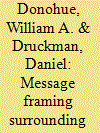| Srl | Item |
| 1 |
ID:
098570


|
|
|
|
|
| Publication |
2010.
|
| Summary/Abstract |
With a looming energy crisis, energy conservation and attention to environmental problems are warranted. The transport sector experiences great challenges to introduce more environmental friendly renewable energy like biofuels. The majority of the Belgian people are asking for more information about this issue. Because individuals are sensitive to how information is presented, the choice of the message frame can significantly influence attitudes and behavioural intention. Because of the strengthening effect on both concern and PCE, our findings suggest that for the prevention of energy and environmental problems and the promotion of a more sustainable and environmental friendly energy consumption not the gravity of these problems and the possible disadvantages but the possibilities to overcome these problems (e.g. reduction of energy use, environmental friendly energy sources) have to be stressed. Men, higher educated people, people between 35 and 54 years old and people with the most pro-environmental attitude are less affected by the message frame, while the choice of the frame is more important when addressing women, people younger than 35 and older than 55 years, lower educated and less pro-environmental people.
|
|
|
|
|
|
|
|
|
|
|
|
|
|
|
|
| 2 |
ID:
086006


|
|
|
|
|
| Publication |
2009.
|
| Summary/Abstract |
The purpose of this study is to explore the relationship between the secret negotiations and the public rhetoric of Palestinian and Israeli leaders leading up to the Oslo I Accords. To accomplish this goal, we coded public statements made by Israeli and Palestinian leaders in the months preceding the accords and the events that unfolded during the talks. We hypothesized that the Palestinian leaders, as nonstate actors, would engage in outbidding by showing a more aggressive, backward-looking orientation in public. Israeli leaders, as state actors, would engage in frontstage-backstage behavior and display a more balanced public rhetoric. The results showed that the Palestinians focused on justice issues framed as mistrust and backward looking. This public framing was associated with retreat in the private talks. In contrast, the Israelis switched between positively and negatively framed rhetoric with forward-looking and affiliative statements correlated with lack of progress and backward-looking and mistrust rhetoric associated with progress in the talks.
|
|
|
|
|
|
|
|
|
|
|
|
|
|
|
|